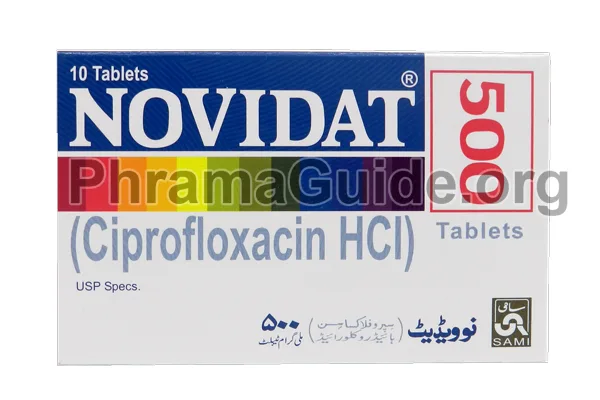Novidat is an antibiotic medication commonly used to treat various bacterial infections. It belongs to the fluoroquinolone class of antibiotics. However, like any medication, Novidat tablets come with potential side effects, warnings, and drug interactions that you need to be aware of.

Common Side Effects of Novidat Tablet
These side effects are relatively common and may not require medical attention unless they become severe or persistent:
Nausea
- Vomiting
- Diarrhea
- Stomach pain
- Headache
- Dizziness or lightheadedness
- Rash
Serious Side Effects of Novidat Tablet
While less common, Novidat tablets can cause more severe side effects. Contact a healthcare provider immediately if you experience any of the following:
- Tendon rupture or inflammation, especially in the Achilles tendon
- Severe diarrhea or bloody stools
- Nervous system effects like confusion, hallucinations, or seizures
- Allergic reactions, including rash, itching, swelling, severe dizziness, or difficulty breathing
- Irregular heartbeat or palpitations
- Severe stomach or abdominal pain
- Unusual tiredness or weakness
- Joint or muscle pain
- Yellowing of the eyes or skin (jaundice)
Warnings and Precautions of Novidate Tablets
- Tendon Rupture: Novidat tablet may increase the risk of tendon rupture, particularly in the Achilles tendon. It is more common in older adults and those who engage in strenuous physical activity. Avoid exercise that involves excessive strain on the affected tendon during treatment.
- Photosensitivity: Novidat tablet can make your skin more sensitive to sunlight, increasing the risk of sunburn. Protect your skin from direct sunlight, use sunscreen, and wear protective clothing when outdoors.
- Central Nervous System Effects: Some individuals may experience nervous system effects like confusion, dizziness, hallucinations, and seizures. Use caution when operating machinery or driving until you know how the medication affects you.
- Antibiotic Resistance: Overuse or inappropriate use of antibiotics can contribute to antibiotic resistance. Novidat tablets should only be used for bacterial infections, and you should complete the full course of treatment as prescribed.
- Pregnancy and Breastfeeding: Novidat tablets may not be safe during pregnancy or breastfeeding. Consult your healthcare provider before using this medication if you are pregnant, planning to become pregnant, or breastfeeding.
Drug Interactions with Novidat Tablet
Novidat tablets can interact with other medications, potentially affecting their effectiveness or increasing the risk of side effects. Some common drug interactions include:
- Antacids and Multivitamins: Novidat tablet absorption may be reduced when taken with antacids or products containing calcium, magnesium, aluminum, iron, or zinc. To avoid this interaction, take these products at least 2 hours before or 6 hours after the Novidat tablet.
- Warfarin (Coumadin): Novidat tablets may increase the effects of warfarin, leading to an increased risk of bleeding. Frequent monitoring of blood clotting times is essential when these medications are used together.
- Theophylline: Novidat tablets can increase the levels of theophylline in the blood, potentially leading to toxic effects. Dose adjustments and close monitoring are necessary if both drugs are used.
- Certain Medications that Affect Heart Rhythm: Novidat tablets can prolong the QT interval in the heart’s electrical activity. Using it with other medications that affect heart rhythm, like certain antiarrhythmics or antipsychotic drugs, may increase the risk of irregular heart rhythms.
Check out the detailed information on Novidat Tablet Uses

Leave A Comment